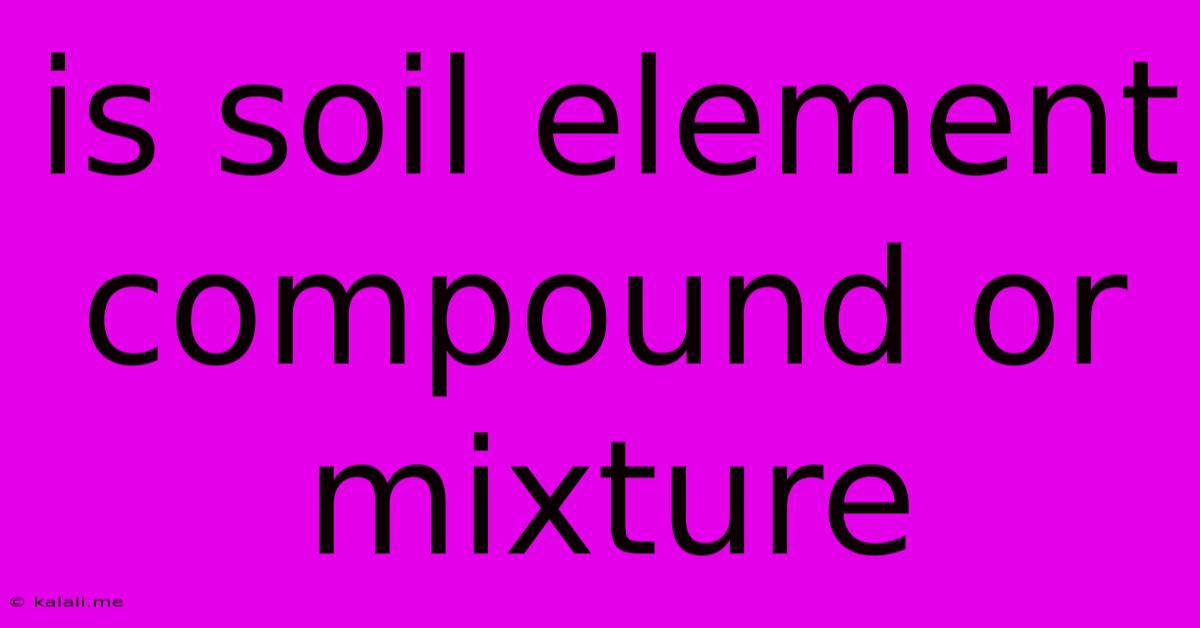Is Soil Element Compound Or Mixture
Kalali
Jun 12, 2025 · 3 min read

Table of Contents
Is Soil an Element, Compound, or Mixture? A Deep Dive into Soil Composition
Soil, the foundation of terrestrial life, is far more complex than it initially appears. Understanding its fundamental nature—is it an element, a compound, or a mixture?—is crucial to appreciating its vital role in ecosystems and agriculture. This article will delve into the composition of soil, clarifying its classification and exploring the various components that make it such a dynamic and essential resource.
Soil is undeniably a mixture. Unlike elements (pure substances consisting of only one type of atom, like oxygen or iron) or compounds (substances formed by chemically combining two or more elements in a fixed ratio, like water or carbon dioxide), soil is a heterogeneous blend of various inorganic and organic materials. This makes it a complex system with diverse physical and chemical properties.
Let's break down the components of this intricate mixture:
The Inorganic Components of Soil
-
Minerals: These are the weathered remnants of rocks and are the predominant inorganic component. They provide essential nutrients like potassium, phosphorus, and calcium, crucial for plant growth. The size and type of mineral particles greatly influence soil texture and structure. Common minerals include quartz, feldspar, and mica.
-
Water: Soil water acts as a solvent, transporting nutrients to plant roots and facilitating various chemical reactions within the soil. Water content significantly impacts soil properties, affecting its aeration, temperature, and workability.
-
Air: Soil air fills the spaces between soil particles, providing oxygen for plant roots and soil organisms. The proportion of air and water in the soil pore spaces is dynamic and influenced by factors such as rainfall and drainage.
The Organic Components of Soil
-
Humus: This is dark, organic matter formed by the decomposition of plant and animal residues. Humus greatly improves soil structure, water retention, and nutrient availability. It's a complex mixture of organic compounds, acting as a reservoir of nutrients and a vital component of soil fertility.
-
Living Organisms: Soil teems with a vast array of organisms—bacteria, fungi, insects, earthworms, and more. These organisms play crucial roles in nutrient cycling, decomposition, and soil structure formation. Their activities are fundamental to soil health and ecosystem function.
-
Roots: Living plant roots contribute significantly to the organic component of the soil, providing energy for soil organisms and adding organic matter upon decomposition.
Why Soil is a Mixture, Not an Element or Compound
The presence of numerous distinct components, each with varying physical and chemical properties, firmly establishes soil as a mixture. There's no fixed chemical formula or atomic ratio defining soil. Its composition varies considerably depending on factors like climate, parent material, topography, and biological activity. This heterogeneity is what makes soil such a rich and complex environment.
Understanding the intricacies of soil composition is essential for sustainable land management and agricultural practices. By recognizing soil as a mixture of diverse inorganic and organic components, we can better appreciate its vital role in supporting life on Earth and develop effective strategies for its conservation and enhancement. Further research into soil science reveals ever-increasing complexity, highlighting the importance of this incredible natural resource.
Latest Posts
Latest Posts
-
Which Of The Following Is An Example Of Positive Punishment
Jun 13, 2025
-
What Type Of Consumer Are Humans
Jun 13, 2025
-
The Unit Of Resistance Is The
Jun 13, 2025
-
Which Of The Following Is Not A Characteristic Of Minerals
Jun 13, 2025
-
The Unit Of Capacitance Is The
Jun 13, 2025
Related Post
Thank you for visiting our website which covers about Is Soil Element Compound Or Mixture . We hope the information provided has been useful to you. Feel free to contact us if you have any questions or need further assistance. See you next time and don't miss to bookmark.